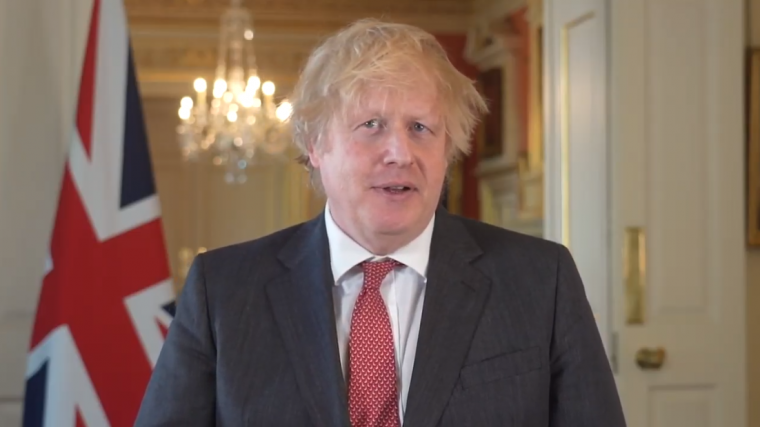Boris Johnson pays tribute to 'inspiring' response of churches during Covid-19

Boris Johnson has thanked Christians for their response to the coronavirus and prayers for his own health in an address to the National Parliamentary Prayer Breakfast 2020.
In a pre-recorded message, the Prime Minister said he was "so pleased" to see the prayer breakfast going ahead online in spite of Covid-19.
"Right now, with services suspended, congregations scattered, even the simple act of coming together to pray can be another hurdle to overcome," he said.
"While work goes on to re-open places of worship safely, it's been absolutely inspiring to see churches respond to the lockdown as they have with true Christian values.
"They've reminded us all of their role as pillars of their communities reaching out to bring hope, peace and practical care to those in need. Thank you, thank you so much for that.
"And thank you also to everyone who prayed for me during my recent illness. It really was appreciated, it certainly seems to have worked.
"This has been a difficult time for many but as ever, our churches are helping to show us the way, so keep up the good work."
Leader of the Opposition Keir Starmer also paid tribute to churches for the work they are doing in "caring for your neighbours and helping hold our communities together".
"Today in my own community, King's Cross Church will be providing emergency food to families, befriending isolated and vulnerable individuals, and supporting local schools, hospitals and the frontline," he said.
"This is just the efforts of one church. I know this is being replicated by churches and faith groups across the whole country.
"We come together today to celebrate the difference faith makes and to thank you for what you're doing to bring hope and good news.
"Together we can build a brighter future. I look forward to seeing you in person at the National Parliamentary Prayer Breakfast in Westminster Hall in 2021."
The prayer breakfast was chaired by Marsha de Cordova MP, and prayers were said by parliamentarians from Westminster and across the UK, including Ian Paisley MP, Dr Lisa Cameron MP, Lord Curry of Kirkharle, Baroness Stroud and Janet Daby MP.
Prayers were said for those who have suffered as a result of coronavirus both in the UK and around the world, as well as NHS and key workers, the Queen, Government and Parliament.

In his sermon, Dr Graham Tomlin, Bishop of Kensington, praised the self-sacrifice of people across the nation in serving others and working on the frontline throughout the pandemic.
However, he said the end of lockdown should not mean a return to individualism as he called on Christians and parliamentarians to work together for a better future.
"We don't entirely want to go back to normal afterwards," he said.
"Maybe our learning to put the common good before our individual choices, to restrain our own desires for the good of our neighbour, is something we can hold onto.
"Maybe we can redress the balance between individual freedoms and the common good a little more in favour of the latter."
Bishop Tomlin went on to speak of the need to address inequality and injustice in communities too.
"Lockdown also had a darker side. It brought us face to face with some of the inequalities of our society," he said.
"In recent weeks, the death of George Floyd has shone a particularly stark light on the undercurrent of racism in our society and the need to address the deeper structural ways it lurks in our hearts and our institutions.
"Racism is all about wanting to protect ourselves, a fear of our neighbour who looks different from us. And recent times have held up a mirror to us and what we have seen is not all good."
He ended by saying he hoped the prayer breakfast would serve as a reminder to parliamentarians of the vital work being carried out by faith communities.
"If we're to solve the challenges facing us in the future, what has been called the three pandemics of our time - coronavirus, racism and climate change - we simply can't go back to the simple individualism of before," he said.
"Maybe the experience of the coronavirus crisis and the amazing grace of the Christian message can teach us a way of living that might just be the saving of us."











